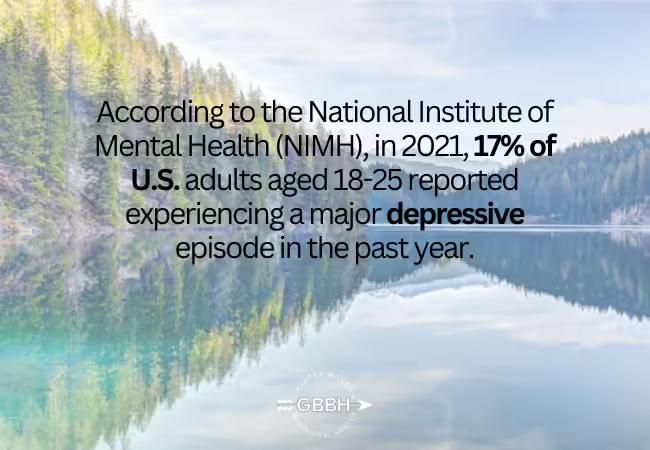Depression is a prevalent and serious mental health challenge that can affect individuals of all ages, but young adults are particularly susceptible. This stage of life, which typically includes individuals aged 18 to 25, comes with significant transitions and pressures, such as leaving home, starting higher education or new careers, navigating adult relationships, and striving for independence. These challenges can become overwhelming and may lead to an increased risk for depression, especially when coping mechanisms are inadequate. Understanding the signs of depression, how to support young adults effectively, and where to seek help can make a crucial difference in their path to recovery.
Depression in Young Adults: Common Misconceptions
Depression is often misunderstood, especially when it comes to young adults. One common misconception is that depression is merely feeling sad or having a bad day. However, depression is a clinical condition that affects mood, behavior, and cognitive functioning. Unlike typical sadness, depression persists over time and can interfere with daily life.
Another misconception is that young adults should simply “snap out of it” or that their struggles are due to immaturity or lack of resilience. This belief dismisses the complex factors contributing to depression, including genetics, neurobiology, and environmental stressors. Depression in young adults is valid and should be taken seriously, as untreated mental health issues can escalate, impacting physical health, social relationships, and overall well-being.
The Connection Between Academic and Social Life and Depression
Young adulthood is often synonymous with new opportunities and significant milestones, such as attending college, starting a career, or forming new social connections. While these experiences can be exciting, they can also come with immense pressure. Academic demands, the desire to succeed, and fear of failure can trigger or exacerbate depression. Young adults may feel overwhelmed trying to balance coursework, part-time jobs, or internships, leading to stress and exhaustion.
Social life also plays a crucial role in mental health during these years. While positive friendships can boost mood and provide support, toxic relationships and social comparisons can have the opposite effect. The pressure to maintain a certain image, especially on social media, can lead to feelings of inadequacy and depression. The disconnect between online personas and real-life experiences can deepen feelings of isolation and unworthiness.
Recognizing Depression in Young Adults
Depression is not just a prolonged feeling of sadness; it’s a multifaceted condition that can impact nearly every aspect of a young adult’s life, from academic performance and job functioning to relationships and overall quality of life. Recognizing the symptoms of depression early can prevent further complications and help individuals start their recovery sooner. Common signs of depression in young adults include:
- Persistent low mood or sadness: This is more than just a “bad day.” It’s a deep, ongoing feeling of sadness or emotional numbness that doesn’t seem to improve.
- Loss of interest or pleasure: Activities that once brought joy or fulfillment may no longer hold any appeal, leading to withdrawal from friends and hobbies.
- Appetite and weight changes: Sudden weight gain or loss, or changes in appetite (either eating much less or much more), can be indicative of depression.
- Sleep disturbances: Whether it’s insomnia or sleeping excessively, disturbances in sleep can contribute to or be a symptom of depression.
- Chronic fatigue: A consistent lack of energy, even after sufficient rest, can be a clear sign of depression.
- Difficulty concentrating: Struggling to focus, make decisions, or complete tasks is another hallmark of depression that can impact school or job performance.
- Feelings of guilt or worthlessness: Persistent, unfounded guilt and low self-esteem can exacerbate the condition and make it more difficult to seek help.
- Thoughts of death or suicide: This is a severe symptom that should be taken very seriously. If you or someone you know is having suicidal thoughts, immediate support from a professional or emergency services is essential.
The Unique Challenges Young Adults Face with Depression
The period of young adulthood is marked by immense change, which can be both exciting and overwhelming. Here are some of the main factors contributing to depression in young adults:
- Life Transitions: Transitioning from high school to college or entering the workforce is stressful. This period may include adjusting to new environments, learning to manage finances, and becoming responsible for oneself in ways that can feel daunting.
- Academic and Professional Pressure: The expectation to perform well academically or professionally can create immense stress. Many young adults feel pressure to excel and meet the high standards set by themselves or others, leading to anxiety and burnout.
- Financial Strain: The financial challenges faced by young adults, including student loans, job insecurity, and the cost of living, can contribute significantly to feelings of stress and hopelessness.
- Social Media Influence: While social media helps young adults stay connected, it can also contribute to unrealistic comparisons and feelings of inadequacy. Constant exposure to others’ curated highlights can make it difficult to appreciate one’s own life, fueling depression.
- Isolation and Loneliness: Moving away from home and establishing new social circles can be difficult, leaving young adults feeling isolated and disconnected, which is a risk factor for depression.
- Existing Mental Health Conditions: Many young adults have underlying mental health conditions such as anxiety disorders, ADHD, or trauma-related disorders that make them more vulnerable to developing depression.
How to Help a Young Adult Struggling with Depression
Supporting a young adult struggling with depression requires empathy, patience, and understanding. Here’s what you can do to help:
- Listen Without Judgment: Provide a space where they feel safe expressing themselves without fear of criticism. Let them talk about what they are going through and assure them that their feelings are valid.
- Encourage Open Dialogue: Let them know that it’s okay to talk about their mental health struggles and that seeking help is a brave and important step.
- Support and Encourage Professional Help: Encourage them to seek help from a mental health treatment center in Massachusetts. Seeking therapy or counseling is a strong and vital step toward recovery.
- Promote Healthy Lifestyle Choices: Encourage activities that promote physical health, such as regular exercise, healthy eating, and maintaining a consistent sleep schedule. These lifestyle choices can support mental health and improve mood.
- Be Patient: Recovery is a process that takes time. Be patient and continue offering support, even if progress seems slow.
Effective Mental Health Treatment Programs for Young Adults
If you or a loved one is seeking help, there are many options available that cater specifically to young adults’ unique needs. These include:
- Cognitive-behavioral therapy (CBT): CBT is an evidence-based approach that helps individuals identify and reframe negative thought patterns that contribute to depression. By changing how one thinks, it is possible to change how one feels and acts.
- Dialectical behavior therapy (DBT): DBT is especially effective for those experiencing emotional dysregulation. It helps build skills in areas like mindfulness, distress tolerance, emotion regulation, and interpersonal effectiveness.
- Intensive Outpatient Programs (IOP): IOPs are ideal for individuals who need more support than traditional outpatient therapy but do not require 24/7 care. These programs typically offer therapy sessions multiple days per week and provide structured support while allowing individuals to maintain some level of independence.
- Partial Hospitalization Programs (PHP): PHPs provide a higher level of care than traditional outpatient therapy. Participants attend therapy for several hours each day but return home in the evenings. PHPs are a great option for individuals who need intensive treatment without inpatient care.
How Depression Impacts Daily Life and Future Goals
Depression can take a toll on every aspect of daily life, from personal habits to long-term aspirations. One major way it impacts young adults is through diminished energy and motivation. Simple tasks that were once manageable, such as getting out of bed, studying, or going to work, can become monumental challenges. This can lead to a downward spiral of missed deadlines, poor academic or job performance, and negative self-perception.
In addition to these immediate effects, depression can have long-term consequences on future goals. Young adults with untreated depression may find it difficult to pursue higher education, start a career, or achieve their ambitions. The lack of motivation and confidence can lead to missed opportunities and potential regret. This is why early intervention is essential: addressing depression promptly can help prevent these long-term impacts and set a young adult on a path toward recovery and fulfillment.
When to Seek Professional Help
Knowing when to seek help can be challenging, but recognizing the signs is essential for timely intervention. If you or someone you know is experiencing persistent feelings of sadness, isolation, or hopelessness, it’s important to reach out for support. Other indicators that professional help may be necessary include significant changes in appetite or sleep patterns, a decline in academic or work performance, and an inability to perform daily activities or maintain relationships.
Seeking professional help doesn’t mean that you’re weak or failing; rather, it shows that you’re taking your mental health seriously and are committed to finding solutions. Early intervention through mental health treatment programs like CBT (Cognitive-behavioral therapy) or DBT (Dialectical behavior therapy) can help individuals develop coping strategies and work through the challenges associated with depression.
Get Help at Greater Boston Behavioral Health
At Greater Boston Behavioral Health, we understand that young adults face unique challenges that require specialized support. Our comprehensive mental health treatment programs are designed to address a range of conditions, including depression, anxiety, and co-occurring disorders. We offer evidence-based therapies like CBT and DBT, ensuring that our clients receive the most effective care.
Our mental health treatment center in Massachusetts provides a range of options to meet different needs, including individual therapy, group therapy, intensive outpatient programs, and partial hospitalization programs. Whether you’re looking for short-term support or more intensive treatment, we are here to help.
Taking the First Step Toward Recovery
If you or someone you know is struggling with depression, it’s important to know that help is available. Taking the first step—whether it’s reaching out for help or encouraging a loved one to do so—can be daunting, but it is also the most courageous step you can take. The right support can make a world of difference, helping young adults find hope, resilience, and the tools they need to navigate life’s challenges with confidence. Call us at (888)278-0716 today to learn more about our services and how we can help you on your journey to recovery!
FAQs About Depression in Young Adults
What are the common misconceptions about depression in young adults?
Misconceptions include the belief that depression is just sadness, or that young adults should be able to “snap out of it.” Depression is a clinical condition that can interfere with daily life and requires understanding, support, and treatment.
What factors contribute to depression in young adults?
Factors include academic pressure, social challenges, the impact of social media, and a lack of strong support systems. Genetics and neurobiology also play significant roles.
How can depression impact a young adult’s daily life?
Depression can lead to decreased energy, lack of motivation, impaired concentration, and challenges with daily tasks. It may also impact personal relationships and hinder academic or career achievements.
When should a young adult seek professional help for depression?
Seek help if feelings of sadness, hopelessness, or isolation persist for weeks or interfere with daily life. Other signs include drastic changes in sleep or appetite, a decline in performance, and difficulty maintaining relationships.
What treatment options are available for depression in young adults?
Effective treatments include Cognitive-behavioral therapy (CBT) and Dialectical behavior therapy (DBT). At Greater Boston Behavioral Health, we offer intensive outpatient programs (IOPs) and partial hospitalization programs (PHPs) for comprehensive support.
How can Greater Boston Behavioral Health support young adults struggling with depression?
Our mental health treatment center in Massachusetts provides tailored therapy programs that include evidence-based treatments, compassionate care, and structured programs to help young adults navigate depression and build a better future.


